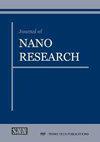Thermal Conductivity and Rheological Studies for Graphene-Al2O3 / Ethylene Glycol-Water Hybrid Nanofluid at Low Temperatures
IF 1
4区 材料科学
Q4 MATERIALS SCIENCE, MULTIDISCIPLINARY
引用次数: 2
Abstract
In this study, the effect of nanoparticle concentration and temperature on the thermophysical properties of graphene-Al2O3/ethylene glycol-water hybrid nanofluid at low temperatures was experimentally investigated. The nanoparticles were characterized by XRD, SEM, TEM and BET methods. The dynamic viscosity and thermal conductivity of the hybrid nanofluids were experimentally determined at different volume concentrations of nanoparticles (0.05%, 0.1%, 0.5%, 1%, 1.5%, 2%, and 2.5%) and at temperatures ranging from 263 to 303 K. The experimental results showed that the incorporation of nanoparticles into the base fluid significantly increased the viscosity. The hybrid nanofluid with solid volume fractions less than 0.5% exhibited Newtonian behavior, while those with higher solid volume fractions (0.5% - 2.5%) exhibited shear-thinning non-Newtonian behavior and followed the power law model. The hybrid nanofluids showed surprising behavior at sub-zero temperatures and low concentration, which can be attributed to oleic acid and graphene nanoplatelets. The thermal conductivity of the hybrid nanofluids increased with increasing temperature and volumetric concentration of the nanoparticles. The ratios of thermal conductivity were increased by about 44.02% and 4.07% at 303 K and 263 K, respectively, with a solid concentration of 2.5 vol%. Based on the experimental results, a reliable correlation was presented to evaluate the thermal conductivity of graphene-Al2O3/ethylene glycol-water hybrid nanofluid at different temperatures and nanoparticle concentrations.石墨烯- al2o3 /乙二醇-水杂化纳米流体的低温导热和流变性研究
实验研究了低温条件下纳米颗粒浓度和温度对石墨烯- al2o3 /乙二醇-水杂化纳米流体热物理性质的影响。采用XRD、SEM、TEM和BET等方法对纳米颗粒进行了表征。在不同体积浓度的纳米颗粒(0.05%、0.1%、0.5%、1%、1.5%、2%和2.5%)和263 ~ 303 K温度下,实验测定了混合纳米流体的动态粘度和导热系数。实验结果表明,纳米颗粒掺入基液可显著提高基液粘度。固体体积分数小于0.5%的混合纳米流体表现出牛顿行为,而较高固体体积分数(0.5% ~ 2.5%)的混合纳米流体表现出剪切变薄的非牛顿行为,并遵循幂律模型。混合纳米流体在零下温度和低浓度下表现出令人惊讶的行为,这可归因于油酸和石墨烯纳米片。混合纳米流体的导热系数随温度和纳米颗粒体积浓度的增加而增加。当固相浓度为2.5 vol%时,在303 K和263 K时,导热系数分别提高了44.02%和4.07%。基于实验结果,提出了一种可靠的相关性来评价石墨烯- al2o3 /乙二醇-水混合纳米流体在不同温度和纳米颗粒浓度下的导热性。
本文章由计算机程序翻译,如有差异,请以英文原文为准。
求助全文
约1分钟内获得全文
求助全文
来源期刊

Journal of Nano Research
工程技术-材料科学:综合
CiteScore
2.40
自引率
5.90%
发文量
55
审稿时长
4 months
期刊介绍:
"Journal of Nano Research" (JNanoR) is a multidisciplinary journal, which publishes high quality scientific and engineering papers on all aspects of research in the area of nanoscience and nanotechnologies and wide practical application of achieved results.
"Journal of Nano Research" is one of the largest periodicals in the field of nanoscience and nanotechnologies. All papers are peer-reviewed and edited.
Authors retain the right to publish an extended and significantly updated version in another periodical.
 求助内容:
求助内容: 应助结果提醒方式:
应助结果提醒方式:


